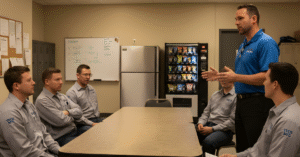Looking for a way to place workers in high-growth jobs while also fueling your economy? The skilled trades are vital for economic prosperity, offer competitive wages, and deliver a faster path to employment than traditional degrees.
The skilled trades are also experiencing the biggest skills shortage in history. The HVAC industry needs 110,000 more technicians. The construction workforce is half a million workers short of industry demand.
Certifications are one way you can prepare people to fill these gaps alongside your education and employment partners. These credentials are relatively quick and inexpensive to provide and give people the basic knowledge and skills needed to get started in the trades. Here are the top four you should consider offering.
1. OSHA
The OSHA Outreach Training Program consists of courses workers can complete to gain important safety knowledge for the workforce, especially in the trades. OSHA stands for the Occupational Safety and Health Administration, the U.S. body governing safety in the workplace. Getting your relevant OSHA credential is a key step in preparing for a new career in construction trades.
If you are looking to partner with a training or education platform, look for providers who offer online OSHA training and credential assessments. For example, Interplay Learning and CareerSafe, an OSHA-authorized training provider, help job-seekers prepare for their OSHA 10-hour or 30-hour assessment and earn their course completion card.
OSHA 10-Hour vs. OSHA 30-Hour
OSHA 10 refers to the entry-level, 10-hour safety course workers should take first. Learners can take a general industry course or a specialized one, such as construction or general industry..
OSHA 30 is a 30-hour course that covers more in-depth topics for supervisors and site managers. Learners can take a general industry course or a specialized one, such as construction. Courses include fall prevention, excavations, and managing safety and health.
What You Can Do with an OSHA Credential
While an OSHA credential helps workers be safer in the workplace, it’s essential in certain industries. Construction, HVAC, plumbing, and electrical all carry more injury risk, and many jobs in those fields require an OSHA 10-Hour Construction Credential. In construction, for example, this credential is common.
An OSHA card can be a foot in the door to multiple trades where job-seekers can learn on the job, work their way up, and build a fulfilling career.
2. EPA 608
To handle any type of refrigerant, you need an EPA 608 certification. The Environmental Protection Agency regulates this under Section 608 of the Clean Air Act. The certification demonstrates that technicians understand how to install, service, and dispose of refrigerant while keeping people and the environment safe from hazardous chemicals.
Learners must pass a comprehensive exam to receive their certification and typically need a certification prep course to learn all the material. A course can be completed in as little as five days. There are several certification types available:
- Type I: For small appliances.
- Type II: For high-pressure appliances.
- Type III: For low-pressure appliances.
- Universal: Covers all types of equipment.
What You Can Do with an EPA 608 Certification
Nearly all HVAC and appliance repair technicians need an EPA 608 certification to enter their career field. The only exception is an apprentice working under close supervision.
Since certification is required by law, the credential gives job applicants an advantage in their job search. Certified individuals stand a good chance of landing an entry-level job. Since the certification has no expiration, it’s an excellent career investment.
3. NATE HVAC
The NATE (North American Technician Excellence) certification is a credential awarded to HVAC technicians who pass a series of knowledge-based exams. This is an industry gold standard that certifies an individual’s knowledge. There are several types of certifications under the NATE umbrella.
- Ready-to-Work Certification: For entry-level technicians with zero to six months of experience entering the field. Participants learn basics about HVAC system components, tools, measurements, and safety. For job-seekers looking to pivot into a new field, this is the certification you want.
- HVAC Support Technician Certification: For technicians with six to 12 months of experience.
- NATE Certification: Technicians with over two years of experience can earn their general NATE certification by taking a general exam and one specialization exam.
- NATE Certified HVACR Professional 5 (CHP-5) Certification: Instead of a traditional NATE certification, HVAC professionals can take five knowledge-based exams in the areas of HVAC Fundamentals, comfort and airflow, electrical and controls, installation, and service.
- Low-GWP Refrigerants: For experienced technicians to gain the knowledge and skills to work safely with A2L refrigerants.
What You Can Do with a NATE HVAC Certification
A NATE HVAC certification is excellent for both entering and advancing in the HVAC profession. The Ready-to-Work certificate helps workers with no background experience to enter the workforce, while other NATE certifications allow them to advance their skills and progress within the profession. To earn a certification, learners typically take courses to prep for their exam through a company like Interplay Learning, the exclusive online provider for the NATE Training Academy.
4. HVAC Excellence
Issued by ESCO Group, HVAC Excellence’s Employment Ready Certifications help assure employers that a learner has the knowledge necessary to enter the workforce as an HVAC technician. The certification is awarded after completion of a standardized exam.
What You Can Do with an HVAC Excellence Employment Ready Certification
HVAC Excellence Employment Ready Certifications are a great fit for job-seekers who are looking to enter the workforce as an entry-level HVAC Technician. These certification exams are standardized in order to ensure that anyone who passes can be reliably trusted to have achieved a certain level of knowledge and expertise. Once a participant passes an exam, they are awarded with a certificate of achievement.
Recognition varies by region and state, so check with local employers to see which credential is preferred in your area.
How Skilled Trade Certifications Can Elevate Your Community
A skilled workforce can attract new businesses to your area, boost economic development, and empower your citizens with rewarding careers.
Certifications are a starting point for high school graduates to enter the workforce, workers of all backgrounds to retrain and switch careers, or experienced trades professionals to advance and progress. Investing in the trades means investing in your community.
Looking for a way to start or strengthen your job-readiness programs? Team up with an accredited partner like Interplay Learning.




